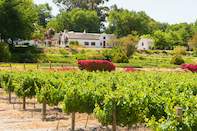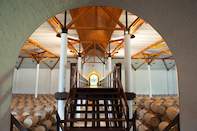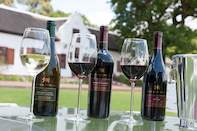An air of tranquility pervades this restored 17th-century French Huguenot wine farm called Plaisir de Merle, where the modern cellar - an architectural masterpiece - blends seamlessly with its historical surroundings.
Place of Pleasure

At nearly 1000 hectares, Plaisir de Merle is big - in fact, it’s one of the largest single wine farms in the Cape winelands. It is also a winery of contrasts, where manicured vineyards that reach to the Simonsberg rub shoulders with tracts of unspoiled natural vegetation.
One of several historic Cape Dutch wine properties owned since the 1960s by wine and spirit producer Stellenbosch Farmers’ Winery (later incorporated into liquor giant Distell), Plaisir de Merle was bought in 2021 by venture capitalist Michael Jordaan (former First National Bank CEO and co-founder of new app-driven digital Bank Zero) and wife Rose, an architect and interiors expert.
The couple cut their teeth as vineyard proprietors rejuvenating his parents’ small Stellenbosch wine farm Bartinney in nearby Banhoek Valley.
While driving past the lower-lying vineyards, look up ahead to the others that cling to the mountainside some 500 metres above sea level. Having parked in the shade of the oak trees, make your way onto the stoep of the 1823 gabled barn.
This is the tasting room, where furnishings are a stylish yet comfortable mix of Cape antiques, well-worn leather chairs and oriental carpets in warm autumn hues (unless there’s already been a refurbishment under the deft hand of Rose Jordaan, who is driving the renaissance of a prime wine property and emerging new wine tourism destination now simply known as Plaisir: French for ‘pleasure’.
The wines are made from hand-picked grapes: Sauvignon Blanc and Chardonnay are followed by Cabernet Sauvignon, Merlot and Shiraz, and finally the Grand Plaisir red blend.
If you’re lucky, your hostess may allow you to taste the ‘unlisted’ wines, such as the recent single-vineyard Cabernet Franc made for the Swedish market. Exports account for at least 70 per cent of the Plaisir de Merle range and are vinified from a selected 80 hectares of the total 400 or so hectares under vines.
Statement Architecture

The style of wine is classic, and shows the French influence of both the farm’s 17th-century beginnings and its modern redevelopment since the early 1990s.
Vintner Paul Pontallier of Bordeaux First Growth Château Margaux - where Plaisir de Merle’s long-serving winemaker Niel Bester gained experience - was influential in the early days of the revamp, which may explain the farm’s enduringly low-key profile despite its wines’ exceptional consistency of character and quality.
Bester still consults for the new cellar chatelaine, young Tim Whitfield (with experience at acclaimed Tokara and Spier). But here, in vintage Bordeaux château style, it’s more about the place than the people. It’s a place that’s being rejuvenated, with investment in replanting vines to optimise the viticultural potential of the property.
The original title deed to the property, dating to 1693, is framed on a wall of the tasting room and tells of the first ownership of French Huguenot Charles Marais, who hailed from the village of Le Plessis Marly (the origin of the farm’s name).
A 1710 sketch shows the scale of the homestead, the historical core of which you’ll see on your way to the winery. You’ll pass the gabled, thatch-roofed manor house, built in 1764, and next to it the long building that once was the shared living quarters of the farmer, his family and his livestock.
Constructed in 1993, the modern cellar is an architectural tour de force by Chris de Hart. Modern, hi-tech winemaking requirements fit seamlessly into the Cape Dutch farm environment, and at the same time the story of Plaisir de Merle is told in eye-catching design features.
The building is set in a slope, its lower level below ground to minimise its impact on its neighbours: the 1831 gabled cellar on one flank and, on the other, the 1821 gabled lynhuis, or row of adjoining rooms, each with its own entrance.
The cellar is anchored by buttresses and surrounded by a sealed, stone-walled moat, and its domed roof is disguised by rounded mouldings with a gargoyle at each corner. A sculpted dove flies above each traditionally arched window.
The main feature, though, is at the front, where a gently curving modern rendition of an early Cape gable sports a massive ‘blazon’ by sculptor Jan Corewijn. This magnificent frieze is a heraldic composition of symbols representing the history of Plaisir de Merle, its people and their family crests: a sailing ship, a lion, a horse, bunches of grapes, barrels and a crescent moon.
All Things Artisanal

Guided by Rose Jordaan, Plaisir has begun its renaissance from a corporate-owned entity to a family-run farm welcoming visitors to share convivial gastronomic experiences. Wine tastings include the choice of pairings with either artisanal fudge or nougat and can be followed by cheese and charcuterie platters, with wines by the glass plus the option of a craft gin or beer as alternatives.
A weekend market hosts local artisanal food producers: Relish gourmet burgers, Alora pizzas, Terbodore coffee, Unframed ice-creams, Rose’s sweet treats, Blended juices and smoothies. It’s also become a desirable gig for up-and-coming musicians.
The historic manor house is available for accommodation and special functions. Vineyard replanting is accompanied by a concerted alien vegetation removal programme in a dedicated commitment to sustainable and eco-friendly wine farming.
At least a third of the substantial property is being reserved and nurtured as a contribution to preserving part of the Cape Floral Kingdom, considered one of the world’s smallest and richest. This can be enjoyed by walkers, joggers and mountain bikers on some 14km of mountainside trails, by prior arrangement at the Plaisir Trail Centre, where bikes are also available to rent.
 The Paarl winelands border Stellenbosch to the north and northeast, opening up into a broad valley with granite outcrops of Paarl Mountain a...
The Paarl winelands border Stellenbosch to the north and northeast, opening up into a broad valley with granite outcrops of Paarl Mountain a...